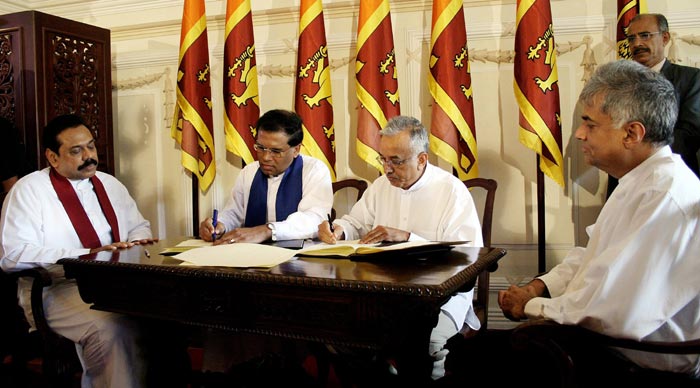Maithripala Sirisena and opposition United National Party senior party official, Malik Samarawickrema (second right) sign an agreement in this photograph taken on October 23, 2006, as then Sri Lankan president Mahinda Rajapakse (left) and then opposition leader Ranil Wickremesinghe look on in Colombo.
AFP/Colombo
Sri Lanka's President Maithripala Sirisena dashed Mahinda Rajapakse's hopes on Thursday of a political comeback in next week's general election by vowing to veto any attempt by his predecessor to become prime minister.
In a letter to his former mentor, Sirisena said he would invoke executive powers to choose someone else from their United People's Freedom Alliance (UPFA) to lead the government should it triumph in Monday's polls.
"Should the party secure a majority, the prime minister should be another senior, but not you," Sirisena said in a five-page letter to Rajapakse whom he toppled as president in January.
"Even if I have to intervene to form a coalition, you will not be the prime minister."
Sirisena named seven other party seniors, including Rajapakse's elder brother Chamal Rajapakse, as potential prime ministerial candidates should their party win.
Political analyst Victor Ivan said the UPFA was not a favourite to win Monday's election and the question of giving the prime minister job to Rajapakse was unlikely to arise.
"What this letter (of Sirisena) shows is the deep-seated enmity between the two men," Ivan told AFP. "It may not make a big difference to the outcome of the election, but it will further discourage Rajapakse's campaign."
The two men had been allies until late last year when Sirisena quit as health minister in order to stand against the veteran strongman in the January 8 presidential election.
Widespread support
Many observers were stunned by Sirisena's victory over Rajapakse who had been in power for nearly a decade and oversaw the crushing of the Tamil Tiger separatist rebels in 2009.
Although Rajapakse is reviled by large sectors of the minority Tamil community, he retains widespread support among ethnic Sinhalese voters and his rallies have drawn big crowds.
Sirisena is the official leader of the UPFA and only reluctantly agreed to allow Rajapakse to stand for the party in the elections.
He has watched aghast as Rajapakse has portrayed himself as UPFA leader during the campaign and has also recoiled at the former president's nationalist rhetoric.
In his letter, Sirisena accused Rajapakse of fuelling communal hatred on the island which still bears the scars of a 37-year ethnic conflict aimed at creating a homeland for Tamils in Sri Lanka's north.
"I urge you not to make statements that fan the flames of ethnic hatred," Sirisena said in his letter, copies of which were released to the press.
Sirisena's bombshell
Officials in Rajapakse's camp confirmed they had received the letter, but declined to comment.
Sirisena's bombshell came a day before campaigning was due to end on Friday, two days ahead of voting.
After winning the presidency, Sirisena overlooked his own party and instead turned to Ranil Wickremesinghe, leader of the smaller United National Party, to become prime minister of a minority administration.
Sirisena was forced to call parliamentary elections a year ahead of schedule after the minority government found its programme obstructed by allies of Rajapakse who dominated parliament until its dissolution.
Since his defeat, there has been an outpouring of corruption allegations against Rajapakse's inner circle, including close relatives.
His wife and two of his brothers are all facing corruption and embezzlement charges. One of his sons has also been implicated in the alleged murder of a former rugby star.

